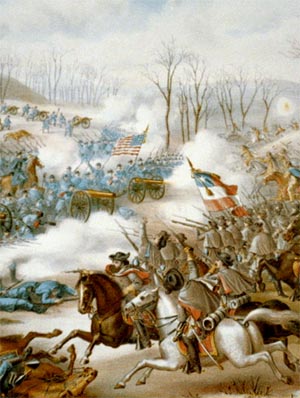Civil War 2.0
On this blog, we write about issues on the horizon. That means that they are ideas that “most people” agree should not be discussed. Our two biggest ones are the clash of civilizations, and the need to avoid ecocide. As issues under the surface of American society, these define much of our present discourse, without being mentioned directly.
The four stages of acceptance: 1. This is worthless nonsense. 2. This is an interesting, but perverse, point of view. 3. This is true, but quite unimportant. 4. I always said so. – J. B. S. Haldane, Journal of Genetics 1963 (Vol 58, p.464), ‘The Truth About Death’.
One of the bigger ones is the American struggle for who we are as a people. This peaked the first time during our American civil war, when an agrarian frontier South that preserved the European feudal system collided with the industrial, urban North. While the political question was states-rights versus a centralized nation-state, and the emotional issue was slavery, the underlying issue was a choice of culture versus bureaucracy.
 When you are of a traditional civilization, there is unity around a cultural ideal: values, language, customs and heritage. This allows such societies to avoid the need for a centralized bureaucratic government, and instead to function as a loosely-knit collection of independent states. Even more, they don’t require much police enforcement or Nanny State programs, because there is an agreed-upon standard of values and goals.
When you are of a traditional civilization, there is unity around a cultural ideal: values, language, customs and heritage. This allows such societies to avoid the need for a centralized bureaucratic government, and instead to function as a loosely-knit collection of independent states. Even more, they don’t require much police enforcement or Nanny State programs, because there is an agreed-upon standard of values and goals.
To the South, the industrial North was much like the society depicted in George Orwell’s “1984” or Aldous Huxley’s “Brave New World”: culture had been dissolved, replaced by a mish-mash of big media newspapers, social pressures, the almighty dollar and of course, a paternalistic government that both subsidized its urban working classes and forced them to toe the line about what was “morally right.” The latter was mostly informed by newspapers, which people politely pretended were not for-profit enterprises that gained power from generating controversy.
We’re fighting this war again, and Governor Jan Brewer in Arizona fired the first shot, by speaking up against illegal immigration. As said above, the really important issues lurk under the surface. When we talk about illegal immigration, we’re actually talking about multiculturalism, or the replacement of a white (mostly Western European in heritage) middle class with a new population.
We’re also talking about the dissolution of culture. Western Europeans have more in common with each other than any other group, and for this reason, the USA did not require much Nanny State government until the multicultural initiative picked up steam in the 1960s. People simply agreed upon what was right, and those who did it were considered good, and others ostracized. As multiculturalism picked up steam, so has our police state: more laws, increased enforcement, more internal conflict.
Even worse, with the loss of culture comes a loss of identity, and its replacement by the big occupiers of modern time:
- News-entertainment and socialization. What do casual acquaintances talk about? Sports, movies, TV shows and what’s on the news. Social behavior has been replaced by a form of social behavior adapted for people who have little in common personally, but can share the same diversions. Unfortunately, it’s shallow and doesn’t provide what we need.
- The pursuit of comfort, convenience and wealth. You have no goal except to be happy. Since we don’t have a positive image of what that is, we can only define it by what it is not: hungry, broke, cold or uncomfortable. This is where hippie ideals and consumerism end up being the same thing. We have freedom, the pursuit of happiness, and capitalism, and in the absence of culture, that translates into buying stuff. What are your favorite CDs, movies and books? That’s how you’ll define yourself in this time. Maybe an emotionally vapid casual sex encounter will help?
- Populist politics and the soft totalitarian state. We can always talk about politics. Like our favorite books and movies, this is how we style ourselves in the absence of cultural roles and goals that reward us for doing the right thing. We can pick any political option we want, as long as it doesn’t strike any social taboos. The result is ongoing debate and dissent but no resolution. In the meantime, government has become more powerful in the absence of culture, and has combined strong central authority with a moral justification of goodwill, producing the paternalistic Nanny State that creates moral codes it demands we follow.
With the Tea Party, Ron Paul and other “fringe” movements going mainstream, we’re seeing the middle classes rebelling against the replacement of their values by these new values. They’re recognizing that these new movements vary in name but are degrees of the same thing, which is a paternalistic state replacing culture and demanding moral obedience from its people in exchange for a promise of equality through subsidies. This violates all of the values the middle class hold dear, and many of them also hold on to values of heritage, religion, and culture that are threatened by this.
These people are not demanding the primacy of their culture, only that they be allowed to pursue it. This is analogous to the South in the pre-Civil War days which wanted a “States’ Rights” platform so that Northern urban states could follow their new style of society, but Southern society could remain unchanged. It’s unclear how much of a role slavery played in that debate, but since slavery was already slowly dying with a change in the agriculture of the South, it may have been a moot point entirely.
Groundswell politics organize around emotional ideas, not clear political statements — at first. In the case of America after Barack Obama, we’re seeing the two sides line up in conditions of extreme Balkanization. While the Tea Party is not “racist” per se, it is a defense of the white American middle class against the newer forms of American society. And as time goes on, the insurrection gains clarity on what it wants: since its members feel they have been indulgent toward the newer progressive dogma, and now see government as a raiding party designed to redistribute their wealth, they are defensive and are working to debilitate the power of the progressive state, particularly its imported voters.
This week, Arizona broke an important taboo — if you act against the progressive state, it tells you that because it works against racism, you must be a racist if you’re defending yourself against it. This subtle sleight of hand assumes that our only political issue is racism and that its only solution is the progressive state solution, which makes it quite manipulative. But with the ice broken, many states are following suit, as they did with resistance to Federal health care:
- New Arizona immigration law sounds good to Butler County officials (OH)
- McInnis would enact harsh Arizona-style immigration laws (CO)
- Delegate Wants Immigration Fight (MD)
- Missouri House of Representatives: HB2449 (MO)
- Texas lawmakers want tough immigration bills (TX)
- South Carolina Legislature: H 4919 (SC)
- Congressman: Deport U.S.-Born Kids of Illegals (CA)
Even more, the law is working without shots being fired or totalitarian measures taken. The easier income was taken away, and the Arizona community returns to defining itself, instead of letting imported labor re-shape it radically over the course of a generation.
 Not surprisingly, the left has retaliated with their oldest insult — recycled from the Civil War 1.0, used to great success in WWII and the Cold War — which is to call anyone who opposes open immigration a “racist.” On the other hand, defying Federal law by stopping enforcement of immigration law is the right thing to do, of course. In fact, most critics haven’t read the law and have no idea what it is about, which is to enact a local version of a Federal law because the Feds aren’t enforcing it.
Not surprisingly, the left has retaliated with their oldest insult — recycled from the Civil War 1.0, used to great success in WWII and the Cold War — which is to call anyone who opposes open immigration a “racist.” On the other hand, defying Federal law by stopping enforcement of immigration law is the right thing to do, of course. In fact, most critics haven’t read the law and have no idea what it is about, which is to enact a local version of a Federal law because the Feds aren’t enforcing it.
As modern people, we are accustomed to reading about the horrors of government and a society where the lowest common denominator prevails, and there are basically no standards for behavior except “don’t get caught.” The middle classes have kept on truckin’ because they have mostly ignored the new permissiveness, and focused instead on their traditional values — hard work, soft Social Darwinism, and a religious/cultural center to life instead of government. They know that without culture — including religion and family values — one lives for either The Company, The State or The Self, or maybe a hybrid of all three.
So as with the first civil war, we see a culture war shaping up in America. It’s those who want culture against those who want a culture of the city, and want us to be more like Brazil, Mexico and other cosmopolitan multicultural nations. It’s those who want to be able to do their thing without a soft totalitarian government telling them what’s right and taking over the education of their children. But most of all, it’s about a fundamental split in values between the somewhat naturalistic middle class and the urban, industrial, utilitarian governments that exhibit the worst aspects of our modern time.
If like many of us you believe that modern society has created a soulless wasteland in addition to bringing us technology, this issue is important. We cannot move ahead except through government until we have agreement in values; infighting in American politics has crippled us. Even more, people like having an ethnic-cultural identity and don’t like it when multiculturalism turns post-racial policies into race-replacement conflict, as class war of any type always does. Finally, we’re wondering when we’re going to stop ongoing ecocide, and the answer is not to be found in laws, but in cultural values favoring nature — and less reckless growth of the type immigration creates.
Bucking a trend is not easy. But with each passing week, we’re seeing more of it happening as the subtle Balkanization of American politics becomes overt. The first step in that process was the election of Barack Obama, who gave us a liberal champion who made the liberal agenda clear to non-liberals. The second step is a separation of the American middle classes who are mobilizing to defend their own interests for once. If we cannot resolve this with politics, our next step is Civil War 2.0.
Tags: crowdism, culture war, tea party









